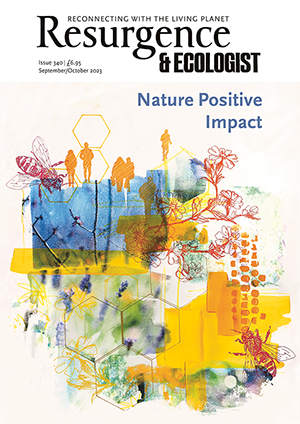I have just got in from the woods, where I have spent a happy hour prising the bark off rotting logs with my two young children, hunting for woodlice. This is in no small part thanks to having finished Richard Smyth’s new book this morning. I’ve always felt that this stuff is good to do with them, but Smyth makes a gentle, persuasive case that there is really nothing more important. That maybe, in small hands grubbing up woodlice, we’re also uncovering something about what it means to be human.
Smyth lives in Yorkshire with his wife and his two small children. Genevieve is three, Daniel two. Written during lockdown, The Jay, the Beech and the Limpetshell is a memoir in celebration of smallness, of places close to home and seen from knee height. “I looked at them looking,” Smyth writes, “and I thought about what it meant to them.” Through chapters loosely held together by objects that his children have gathered – a jay feather, a beech leaf – he poses simple, probing questions, not unlike a toddler repeatedly asking “Why?” until they have plumbed the universe’s depths. Why do we need Nature? What do we want to pass on to our children? Are we all going to be OK?
Nature, for children, is not for consuming at a distance. It is to be grabbed at, climbed on, ingested, shoved in pockets. When Smyth writes about Darwin and Durrell and the rest, they seem nothing if not full-grown children who never learnt to stop. Their desire to gather, their desire to prod, the constant, exhaustive why? Our role as parents, Smyth suggests, is simply facilitating children to still be children at a time when access to Nature is not as simple as it might once have been. In the woods, in the parks, along the canals – given the chance, the children will find it.
Without a doubt, I am the target market here. I am a couple of years younger than Smyth; his children are a couple of years younger than mine. Both in his nostalgia for his own naturalist childhood of rock pools, Willard Price books and Danny the Champion of the World, and in what it means to parent young children in the early 2020s, with Axel Scheffler, Octonauts and Hey Duggee, it is all wonderfully relatable. Smyth is obviously a great dad, but not in the exhausting, aspirational way of parents who trot out their lives on Instagram. When he confesses to only being able to identify six different trees, I found myself almost whooping with joy. Genevieve, of course, thinks he knows everything, and this really is the point. Nature writing can serve the perverse function of further severing us from Nature by making it seem out of reach, a place for experts. But all children require is an infectious sense of wonder and for someone to point the way to the puddles.
There is a parallel between our collective uncertainty about the direction of our future, and the uncertainty that every parent feels in the unmapped lives of their young children. But as well as the anxiety, every young parent must learn to trust. There are no big answers here, no bold claims that if the next generation reconnects with Nature everything will be fine. But there is little space for hand wringing either. Whatever the future that is unfolding, children will still explore, build dens and taste worms: it’s how they are, given half a chance. “This is what I think kids see in forests,” writes Smyth. “Possibility.” And if we can believe in possibility, we can still believe in hope.
The Jay, the Beech and the Limpetshell: Finding Wild Things with My Kids by Richard Smyth. Icon Books, 2023. ISBN: 9781785788024.







